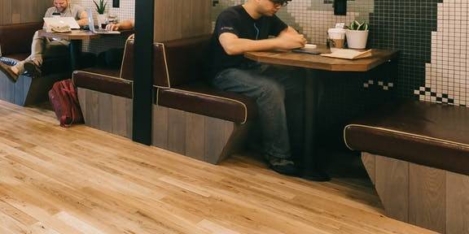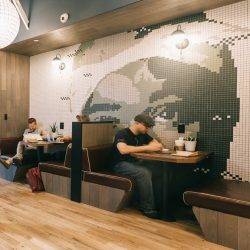July 16, 2019
The workplace of tomorrow redefined by learning and AI
 Unily has released a report analysing the trends and issues shaping the workplace of tomorrow. The report, ‘Future of the Workplace 2030+’, has been co-created with the futurist Anne Lise Kjaer, a regular on the TED Talks circuit best known for the book The Trend Management Toolkit. Looking at the transformation of our working lives over the next 10 years and beyond, the report explores both the challenges and the opportunities as companies prepare for a new wave of technological advances and a new generation of workers. It sets out specific challenges including how to incorporate Generation Z in the workplace, integrate new technology and face greater scrutiny of organisational values. It also suggests that new jobs will emerge such as ‘Vice President of No’, ‘Professional Rebel’ and ‘Ideas Broker’. (more…)
Unily has released a report analysing the trends and issues shaping the workplace of tomorrow. The report, ‘Future of the Workplace 2030+’, has been co-created with the futurist Anne Lise Kjaer, a regular on the TED Talks circuit best known for the book The Trend Management Toolkit. Looking at the transformation of our working lives over the next 10 years and beyond, the report explores both the challenges and the opportunities as companies prepare for a new wave of technological advances and a new generation of workers. It sets out specific challenges including how to incorporate Generation Z in the workplace, integrate new technology and face greater scrutiny of organisational values. It also suggests that new jobs will emerge such as ‘Vice President of No’, ‘Professional Rebel’ and ‘Ideas Broker’. (more…)









 A majority of European workers (57 percent) believe that technology will help to bring about a four day week in the near future as it improves their productivity and efficiency, according to
A majority of European workers (57 percent) believe that technology will help to bring about a four day week in the near future as it improves their productivity and efficiency, according to 
 Socialising and drinking opportunities are some of the least enjoyable things about working in London, as loving their job and a chance to grow personally is more of an incentive for those who work in the Capital, a new report suggests. The survey of 1,000 London workers by Flexioffices, claims that 75 percent of employees in the city enjoy going to work for the personal development opportunities, training and the job itself. Flexible hours are becoming an increasingly enticing aspect of a job, with 21 percent of London workers liking their workplace because of the flexible hours available.
Socialising and drinking opportunities are some of the least enjoyable things about working in London, as loving their job and a chance to grow personally is more of an incentive for those who work in the Capital, a new report suggests. The survey of 1,000 London workers by Flexioffices, claims that 75 percent of employees in the city enjoy going to work for the personal development opportunities, training and the job itself. Flexible hours are becoming an increasingly enticing aspect of a job, with 21 percent of London workers liking their workplace because of the flexible hours available.
 Employers need to better understand the needs of younger candidates, particularly that of flexible working, says Gartner, after its latest Global Labor Market Survey claims that a rise in Gen Z candidate’s regrets is leading to high turnover, low engagement and low productivity. According to the survey, 40 percent of Gen Z respondents reported that they would not repeat their decision to accept the job offer they had accepted and only 51 percent said they could see themselves having a long career at their organisation. More than one-third of candidates who regret their decision intend to leave their position within 12 months.
Employers need to better understand the needs of younger candidates, particularly that of flexible working, says Gartner, after its latest Global Labor Market Survey claims that a rise in Gen Z candidate’s regrets is leading to high turnover, low engagement and low productivity. According to the survey, 40 percent of Gen Z respondents reported that they would not repeat their decision to accept the job offer they had accepted and only 51 percent said they could see themselves having a long career at their organisation. More than one-third of candidates who regret their decision intend to leave their position within 12 months.




 Small and mid-sized businesses have hired three times more people than larger businesses over the past five years and could overtake large companies by 2030, according to new analysis of the latest ONS data commissioned by Santander Business Banking. However, separate research commissioned by the bank has found that significant numbers of young people are failing to recognise the significant job opportunities that SMEs offer. Just a third (35 percent) of Generation Z and Millennials leaving full time education say they wish to work for an SME, while an even smaller proportion, just one in six (18 percent), want to work for a start-up or micro business.
Small and mid-sized businesses have hired three times more people than larger businesses over the past five years and could overtake large companies by 2030, according to new analysis of the latest ONS data commissioned by Santander Business Banking. However, separate research commissioned by the bank has found that significant numbers of young people are failing to recognise the significant job opportunities that SMEs offer. Just a third (35 percent) of Generation Z and Millennials leaving full time education say they wish to work for an SME, while an even smaller proportion, just one in six (18 percent), want to work for a start-up or micro business. 


 Over seven in ten UK employees want their employers to do more to motivate them claims a new study from Reward Gateway which suggests that some of the alarming effects that being unmotivated has on employees included a worsening in mood (60 percent); reduction in productivity levels (48 percent); declining mental health (46 percent) and a reduction in quality of work (40 percent). Over a quarter (26 percent) say their relationships with family and friends suffer and 2 in 10 admit to drinking more alcohol when lacking motivation.
Over seven in ten UK employees want their employers to do more to motivate them claims a new study from Reward Gateway which suggests that some of the alarming effects that being unmotivated has on employees included a worsening in mood (60 percent); reduction in productivity levels (48 percent); declining mental health (46 percent) and a reduction in quality of work (40 percent). Over a quarter (26 percent) say their relationships with family and friends suffer and 2 in 10 admit to drinking more alcohol when lacking motivation.
 Young people leaving education and looking for work may be missing out on potential employment opportunities by failing to consider Small and Medium Enterprises (SMEs) and the advantages they offer, new research from Santander UK claims. ‘Gen Z’ and Millennials do not believe SMEs offer the same job security or salary as large businesses, meaning just a third (35 percent) of young people leaving education in 2018 want to work for smaller employer, and an even smaller proportion, just one in six (18 percent), want to work for a start-up or micro business. The most popular career aspirations for Generation Z and Millennials are to work for a large firm (51 percent), the public sector (51 percent) or a global multinational (49 percent), because of a perceived lack of job security (56 percent). There is also the belief that SMEs offer a lower salary (46 percent) and fewer opportunities for progression than large companies (33 percent). Yet the majority (70 percent) of SMEs are actively recruiting for entry level roles, whether that be graduates (43 percent), further education leavers (36 percent) or school leavers (35 percent).
Young people leaving education and looking for work may be missing out on potential employment opportunities by failing to consider Small and Medium Enterprises (SMEs) and the advantages they offer, new research from Santander UK claims. ‘Gen Z’ and Millennials do not believe SMEs offer the same job security or salary as large businesses, meaning just a third (35 percent) of young people leaving education in 2018 want to work for smaller employer, and an even smaller proportion, just one in six (18 percent), want to work for a start-up or micro business. The most popular career aspirations for Generation Z and Millennials are to work for a large firm (51 percent), the public sector (51 percent) or a global multinational (49 percent), because of a perceived lack of job security (56 percent). There is also the belief that SMEs offer a lower salary (46 percent) and fewer opportunities for progression than large companies (33 percent). Yet the majority (70 percent) of SMEs are actively recruiting for entry level roles, whether that be graduates (43 percent), further education leavers (36 percent) or school leavers (35 percent).
 As fresh graduates from generation Z, i.e. those born between the mid 1990’s and 2000 are enter the workplace, new research from Perkbox claims that over 1 in 3 (36 percent) admit that the workplace perks are one of the most important deciding factors on whether to accept a new job or not. These post-millennials are also the group most likely (32 percent) to prefer smaller benefits that they can enjoy on a more frequent basis, all-year-round, over one annual event, such as a Christmas party. The top three workplace perks most popular amongst Generation Z included simple benefits, such as receiving a day’s annual leave on your birthday (86 percent), followed by free coffee and hot drinks (85 percent), and flexi-hours (83 percent). Despite this, Generation Z feel less deserving of workplace benefits than co-workers born pre-1995, with fewer than half (38 percent) believing they should benefit from such offerings – which is less than any other age group.
As fresh graduates from generation Z, i.e. those born between the mid 1990’s and 2000 are enter the workplace, new research from Perkbox claims that over 1 in 3 (36 percent) admit that the workplace perks are one of the most important deciding factors on whether to accept a new job or not. These post-millennials are also the group most likely (32 percent) to prefer smaller benefits that they can enjoy on a more frequent basis, all-year-round, over one annual event, such as a Christmas party. The top three workplace perks most popular amongst Generation Z included simple benefits, such as receiving a day’s annual leave on your birthday (86 percent), followed by free coffee and hot drinks (85 percent), and flexi-hours (83 percent). Despite this, Generation Z feel less deserving of workplace benefits than co-workers born pre-1995, with fewer than half (38 percent) believing they should benefit from such offerings – which is less than any other age group.







